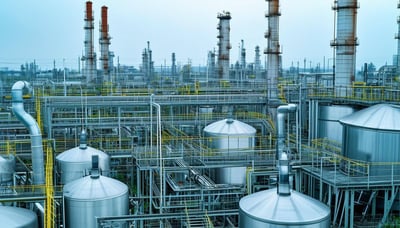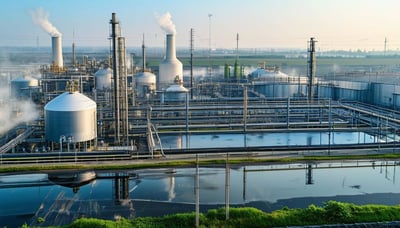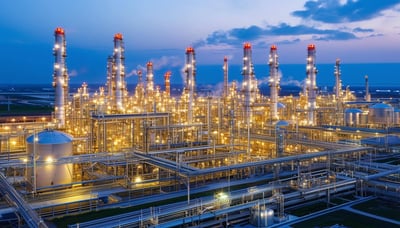Environmental Impact Assessment in Production Scheduling
In modern manufacturing, where efficiency and productivity reign supreme, there exists a silent but potent player: environmental impact. As production schedulers in chemical manufacturing facilities, your role is pivotal not only in optimizing operations but also in minimizing ecological footprints.
In this blog, we look into the realm of environmental impact assessment in scheduling, exploring strategies, challenges, and the integration between advanced scheduling solutions like PlanetTogether and prominent ERP, SCM, and MES systems such as SAP, Oracle, Microsoft, Kinaxis, and Aveva.

Understanding the Environmental Imperative
The urgency to address environmental concerns has never been more pressing. With climate change looming large and regulatory bodies tightening the reins on emissions and waste disposal, businesses are under increasing scrutiny to align with sustainable practices. Chemical manufacturing, known for its significant environmental footprint, stands at the crossroads of innovation and responsibility.

The Role of Production Schedulers
Production schedulers wield considerable influence over the manufacturing process. Your decisions ripple through the supply chain, impacting resource utilization, energy consumption, and waste generation. Recognizing this, integrating environmental considerations into scheduling becomes imperative.

Challenges in Environmental Impact Assessment
Despite the growing awareness of sustainability, several challenges hinder the seamless integration of environmental impact assessment into production scheduling:
Data Accessibility and Accuracy: Environmental impact assessment relies heavily on data pertaining to resource consumption, emissions, and waste generation. However, disparate data sources and varying degrees of accuracy pose hurdles.
Complexity of Operations: Chemical manufacturing processes are inherently complex, with numerous variables at play. Predicting the environmental implications of scheduling decisions amidst this complexity requires sophisticated analytical tools.
Balancing Competing Objectives: Schedulers often face the dilemma of balancing environmental objectives with productivity targets and customer demands. Striking the right balance necessitates a nuanced understanding of trade-offs.
Regulatory Compliance: Evolving regulations add another layer of complexity. Schedulers must stay abreast of regulatory changes and ensure compliance without compromising operational efficiency.

Integration of Advanced Scheduling Solutions and ERP Systems
Enterprises leverage advanced scheduling solutions like PlanetTogether to optimize production schedules and maximize resource utilization. These solutions offer robust features for scenario analysis, constraint-based optimization, and real-time monitoring. However, to realize their full potential in environmental impact assessment, seamless integration with ERP systems is crucial.
SAP Integration: SAP, a leading ERP provider, offers modules for environmental compliance and sustainability reporting. Integration with PlanetTogether enables real-time exchange of data, facilitating dynamic adjustments to schedules based on environmental metrics.
Oracle Integration: Oracle's ERP suite includes environmental management applications that track emissions, energy consumption, and waste generation. By integrating with PlanetTogether, schedulers gain holistic visibility into environmental impacts across the production lifecycle.
Microsoft Dynamics Integration: Microsoft Dynamics offers ERP capabilities with built-in sustainability features. Integration with PlanetTogether enhances decision-making by incorporating environmental considerations into scheduling algorithms.
Kinaxis Integration: Kinaxis provides supply chain planning solutions with a focus on sustainability. By integrating with PlanetTogether, schedulers can align production schedules with environmental objectives while optimizing supply chain performance.
Aveva Integration: Aveva offers MES solutions for process industries, including tools for environmental monitoring and compliance. Integration with PlanetTogether enables synchronized planning and execution, driving operational efficiency without compromising sustainability goals.
The synergy between advanced scheduling solutions and ERP systems empowers production schedulers to make informed decisions that reconcile environmental stewardship with operational excellence.

Best Practices for Environmental Impact Assessment in Scheduling
To navigate the complexities of environmental impact assessment effectively, production schedulers can adopt the following best practices:
Data Integration: Consolidate data from disparate sources, including ERP systems, environmental monitoring tools, and production databases, to create a unified view of environmental performance.
Scenario Analysis: Leverage advanced scheduling solutions to conduct scenario analysis, simulating the environmental impacts of different scheduling decisions. Evaluate trade-offs and identify optimal solutions that balance environmental and operational objectives.
Continuous Monitoring: Implement real-time monitoring mechanisms to track key environmental metrics during production execution. Adjust schedules dynamically in response to deviations from sustainability targets.
Collaborative Decision-Making: Foster collaboration between cross-functional teams, including environmental experts, production managers, and IT personnel, to ensure alignment between environmental goals and scheduling priorities.
Investment in Technology: Embrace emerging technologies such as artificial intelligence, machine learning, and IoT sensors to enhance predictive capabilities and optimize resource utilization while minimizing environmental impact.
In the pursuit of operational excellence, production schedulers in chemical manufacturing facilities must embrace their role as custodians of the environment. By integrating environmental impact assessment into scheduling processes and leveraging advanced scheduling solutions such as PlanetTogether in tandem with ERP systems, organizations can achieve a harmonious balance between profitability and sustainability.
As stewards of our planet, let us chart a course towards a greener, more resilient future through enlightened scheduling practices. Are you ready to take your manufacturing operations to the next level? Contact us today to learn more about how PlanetTogether and integrated scheduling solutions can help you achieve your sustainability goals and drive success in the chemical industry.

























LEAVE A COMMENT